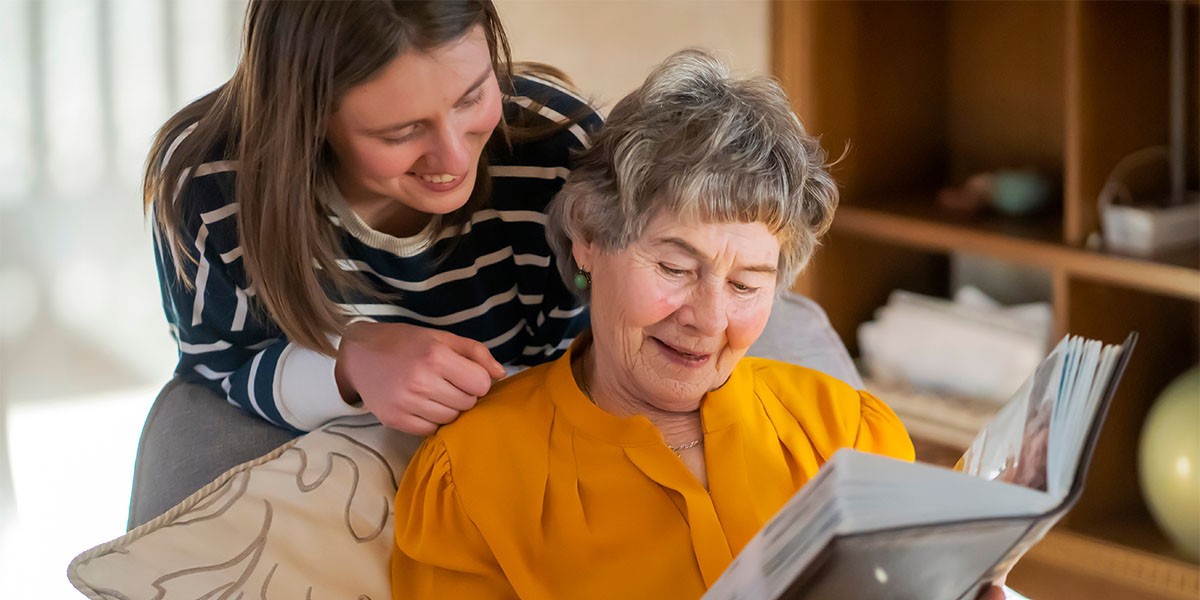Dementia Medications: A Guide for Families and Staff

In dementia care, the right medications can make a difference in managing challenging behaviors. Historically, many physicians have prescribed antipsychotics, a dangerous approach that doesn’t fit the science.
Instead, GuideStar Eldercare often prescribes a combination of two drugs that help the brain function better. Here’s a quick guide to why we use this treatment approach—and how it can improve quality of life for someone you care for.
Behavior changes in dementia
Alzheimer’s disease and other forms of dementia can cause major changes in behavior. You might see someone you care for becoming agitated or even aggressive. They may experience delusions, like believing someone has stolen from them. They may wander or become lost.
These troubling behaviors happen because the disease changes how the brain is working. They are symptoms of dementia. A major concern in nursing home care is that residents have historically been treated as if they have a psychiatric illness, like schizophrenia. They’ve been treated with dangerous antipsychotics to control their behavior. Plenty of research tells us that’s not the right answer.
GuideStar Eldercare practitioners recognize dementia as a neurological illness—not a psychiatric illness. A medical specialty, neurology has to do with how the brain and nervous system function.
“As Alzheimer’s progresses, brain cells die and connections among cells are lost, causing cognitive symptoms to worsen,” explains the Alzheimer’s Association. We focus on what’s not working well in the brain and use medications to improve thinking. This approach can help reduce distress and minimize challenging behaviors.
Two drugs that help
GuideStar often prescribes a pair of medications to treat the neurology behind dementia symptoms. These are:
- Aricept, Exelon, or Razadyne - a drug that increases levels of acetylcholine in the brain. Acetylcholine is a body chemical that helps nerves transmit signals. Using one of these drugs helps the brain function better, improving memory, concentration, and thinking.
- Memantine – a drug that targets a different active chemical in the brain called glutamate. Explains the Alzheimer’s Association, this drug is used to “improve memory, attention, reason, language, and the ability to perform simple tasks.”
These drugs cannot cure or stop the progression of dementia. But this combination helps people living with dementia think at their best, resulting in a better quality of life.
This is a general approach based on best practices. We assess each resident one-on-one and develop an accurate diagnosis. Then, we tailor drug and treatment plans to the individual needs of each resident. Ongoing monitoring and review help us manage and refine care.
Not antipsychotics
These two medications together reduce the frequency and severity of challenging behaviors. They are not antipsychotics, which can be dangerous for many people. Antipsychotics are strongly discouraged by the Centers for Medicare & Medicaid Services, which oversees nursing home care. You can watch Steven Posar, MD, explain the problems with antipsychotics on Facebook or LinkedIn.
The drug pairing GuideStar often prescribes works entirely differently and is much safer. It’s an alternative to antipsychotics. It targets the neurology and is backed by extensive medical research. It presents fewer risks and helps individuals function better.
FDA-indicated drugs
The drugs we often recommend—Aricept, Exelon, or Razadyne, along with memantine—are recognized by the FDA as being indicated for use in Alzheimer's. This means the FDA has found that they are effective, based on well-controlled studies. (In contrast, the FDA has not approved antipsychotics for use in dementia care.)
By treating the neurology and brain changes behind dementia symptoms, GuideStar has dramatically reduced the use of antipsychotics in nursing homes, and that’s our goal for everyone under our care. We see the residents we are privileged to serve feeling better, functioning better, and staying on a more even keel behaviorally.
At GuideStar Eldercare, our mission is to enhance the quality of life for our shared patients by easing their suffering while actively promoting their safety, functionality, and dignity. Our science-based approach to medications in dementia care helps residents, families, and caregivers live better lives.
Do you have questions? Reach out to the GuideStar team. We’re here to help.
